初中介词用法总结与练习
初中英语介词用法总结与归纳
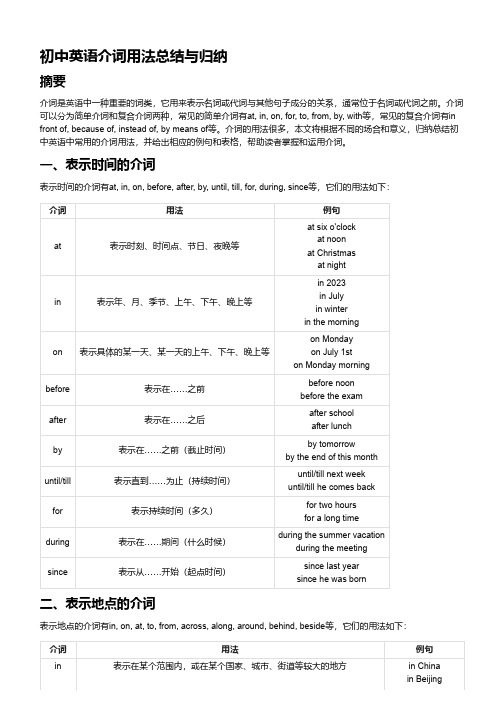
初中英语介词用法总结与归纳摘要介词是英语中一种重要的词类,它用来表示名词或代词与其他句子成分的关系,通常位于名词或代词之前。
介词可以分为简单介词和复合介词两种,常见的简单介词有at, in, on, for, to, from, by, with等,常见的复合介词有in front of, because of, instead of, by means of等。
介词的用法很多,本文将根据不同的场合和意义,归纳总结初中英语中常用的介词用法,并给出相应的例句和表格,帮助读者掌握和运用介词。
一、表示时间的介词表示时间的介词有at, in, on, before, after, by, until, till, for, during, since等,它们的用法如下:介词用法例句at表示时刻、时间点、节日、夜晚等at six o'clock at noonat Christmas at nightin表示年、月、季节、上午、下午、晚上等in 2023in Julyin winterin the morningon表示具体的某一天、某一天的上午、下午、晚上等on Mondayon July 1ston Monday morningbefore表示在……之前before noon before the examafter表示在……之后after school after lunchby表示在……之前(截止时间)by tomorrowby the end of this monthuntil/till表示直到……为止(持续时间)until/till next week until/till he comes backfor表示持续时间(多久)for two hours for a long timeduring表示在……期间(什么时候)during the summer vacation during the meetingsince表示从……开始(起点时间)since last year since he was born二、表示地点的介词表示地点的介词有in, on, at, to, from, across, along, around, behind, beside等,它们的用法如下:介词用法例句in表示在某个范围内,或在某个国家、城市、街道等较大的地方in Chinain Beijing介词用法例句in ZhongshanRoadon表示在某个表面上,或在某个楼层、台阶等较小的地方,或在某个方位上on the wall on the secondflooron the left/rightat 表示在某个具体的位置或地点,或在某个机构、场所等较小的地方,或表示靠近、附近等at the cornerat schoolat the bus stopto表示朝向某个方向或地点,或表示到达某个地点(范围之外)to the east to Japan to schoolfrom表示从某个地点出发或离开(范围之外)from home from Shanghai from Chinaacross表示横穿或穿过(从一边到另一边)across the street across the riveralong表示沿着或顺着(在一边)along the road along the riveraround表示围绕或环绕(在四周)around the lake around the worldbehind表示在……后面behind the door behind himbeside表示在……旁边beside the window beside her三、表示方向的介词表示方向的介词有to, from, into, out of, onto, off, up, down, through等,它们的用法如下:介词用法例句to表示朝向某个方向或地点,或表示目的地He is going to Beijing. She gave the book to me.from表示从某个方向或地点出发或离开,或表示来源He came from the south. This is a gift from my friend.into表示进入某个范围或空间(由外到内)He jumped into the water. She put the flowers into the vase.out of表示离开某个范围或空间(由内到外)He ran out of the room. She took the book out of the bag.onto表示移动到某个表面上(由低到高)He climbed onto the roof. She threw the ball onto the ground.off表示从某个表面上移开(由高到低)He fell off the bike. She took off her hat.up表示向上移动(由低到高)He went up the hill.介词用法例句She climbed up the ladder.down表示向下移动(由高到低)He came down the stairs. She slid down the slide.through表示穿过某个空间或物体(从一端到另一端)He walked through the forest. She looked through the window.四、表示方式、手段、工具的介词表示方式、手段、工具的介词有by, with, in, on等,它们的用法如下:介词用法例句by 表示交通工具、方式、方法等,或表示被动语态的动作执行者,或表示时间的截止点,或表示计量单位等by busby mistakeby himby tomorrowby weightwith 表示使用某种工具、器具、材料等,或表示伴随的人或物,或表示具有某种特征、状态等,或表示原因、理由等with a knifewith hisparentswith long hairwith joyin 表示使用某种语言、文字、颜色等,或表示穿着某种衣服,或表示处于某种状态、情况等,或表示在某种范围内等in Englishin black andwhitein a red dressin a hurryin generalon 表示使用某种电子设备、媒体等,或表示依靠某种力量、条件等,或表示以某种方式等,或表示参与某种活动等on TVon footon fireon dutyon holiday五、表示原因、目的、结果的介词表示原因、目的、结果的介词有for, at, from, of, with, by, because of, owing to, thanks to, out of, through等,它们的用法如下:介词用法例句for 表示原因、理由,常与sorry, famous, punish, praise, thank, blame等连用,也表示目的、意图,常与hope, wish, wait, look, come, go等连用,也可以表示用途、功能等for peacefor helpfor a walkfor funfor cutting paperat表示目的、意图,常与surprised, shocked, amazed, good, bad等连用,也可以表示针对、针对性等at his words at the news at math介词用法例句at solvingproblemsfrom 表示结果、效果,常与different, far, free, safe等连用,也可以表示来源、出发点等from the picturefrom now onfrom dangerfrom birthof 表示原因、理由,常与afraid, proud, sure, tired等连用,也可以表示所属、属性、特征等of the darkof himof the resultof his workwith 表示原因、理由,常与pleased, satisfied, angry, happy等连用,也可以表示伴随、方式、工具等with the answerwith himwith a smilewith a knifeby 表示方式、方法、手段等,也可以表示被动语态的动作执行者,或表示时间的截止点,或表示计量单位等by doing thisby himby tomorrowby weightbecauseof 表示原因、理由,相当于一个从句,后面接名词或代词等because of therainbecause of thatowing to表示原因、理由,相当于一个从句,后面接名词或代词等owing to the trafficjamowing to hisillnessthanks to表示原因、理由,含有感激或讽刺的意味,后面接名词或代词等thanks to yourhelp thanks to his carelessnessout of表示原因、理由,含有出于某种动机或感情的意味,后面接名词或代词等out of curiosity out of pitythrough表示原因、理由,含有经过某种过程或方式的意味,后面接名词或代词等through hard work through a window六、表示对象、范围的介词表示对象、范围的介词有of, for, about, with, to, from, among, between等,它们的用法如下:介词用法例句of表示所属、属性、特征等,也可以表示分离、脱离等the color of the skya cup of teaa friend of mineget rid of itfor表示目标、对象、受益者等,也可以表示目的、原因等 a gift for youa seat for twoa doctor for the poora room for rentabout表示主题、内容、话题等,也可以表示大约、左右等a book about history tell me about yourself about ten minuteswith表示伴随、陪同等,也可以表示方式、工具等stay with mea man with glasses speak with a loud voice cut it with a knifeto表示方向、目的地等,也可以表示对象、接受者等go to school fly to London say hello to him give it to herfrom表示来源、出发点等,也可以表示对象、对比者等come from Chinaa letter from my father different from youlearn from himamong表示在三个或三个以上的人或物之间(内部)share it among yourselves a flower among the grassbetween表示在两个人或物之间(内部或外部)sit between thema river between two mountains七、其他常用的介词除了上述介词外,还有一些其他常用的介词,如as, like, except, without, beyond, above, below, over, under等,它们的用法如下:介词用法例句as表示身份、职业、角色等,也可以表示方式、方法、程度等as a teacher as usual as you know as well aslike表示相似、类似等,也可以表示喜欢、喜爱等like a birdlike father, like sonI like music.except表示除……之外(不包括)everyone except me every day except Sundaywithout表示没有、缺少等without money without water without a wordbeyond表示超出、超过等beyond the wall beyond my expectation beyond controlabove表示在……之上(不接触)above the ground above sea levelabove allbelow表示在……之下(不接触)below the surface below zero below averageover表示在……之上(覆盖或接触)over the bridge over his head over the phoneunder表示在……之下(覆盖或接触)under the tree under his arm under the weather。
初中英语介词专项讲解及练习(包含答案)
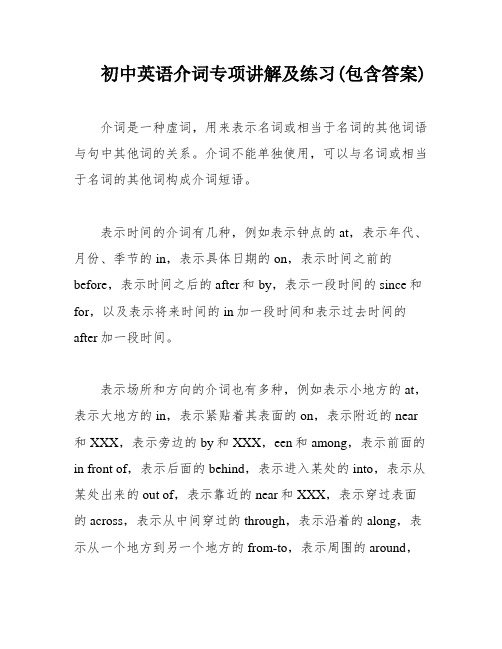
初中英语介词专项讲解及练习(包含答案)介词是一种虚词,用来表示名词或相当于名词的其他词语与句中其他词的关系。
介词不能单独使用,可以与名词或相当于名词的其他词构成介词短语。
表示时间的介词有几种,例如表示钟点的at,表示年代、月份、季节的in,表示具体日期的on,表示时间之前的before,表示时间之后的after和by,表示一段时间的since和for,以及表示将来时间的in加一段时间和表示过去时间的after加一段时间。
表示场所和方向的介词也有多种,例如表示小地方的at,表示大地方的in,表示紧贴着其表面的on,表示附近的near和XXX,表示旁边的by和XXX,een和among,表示前面的in front of,表示后面的behind,表示进入某处的into,表示从某处出来的out of,表示靠近的near和XXX,表示穿过表面的across,表示从中间穿过的through,表示沿着的along,表示从一个地方到另一个地方的from-to,表示周围的around,表示正上方的over,表示正下方的under,表示斜上方的above,表示斜下方的below。
介词的使用需要根据具体情况来判断,掌握介词的用法可以帮助我们更准确地表达自己的意思。
In using a language。
it'XXX to know about the culture and customs of the people you are XXX my experience。
as someone who has lived in different countries。
it's important to adapt and be respectful。
just like you would in your own country.With the right clothing and knowledge。
you can XXX。
初中英语介词用法归纳强化练习3(附答案)
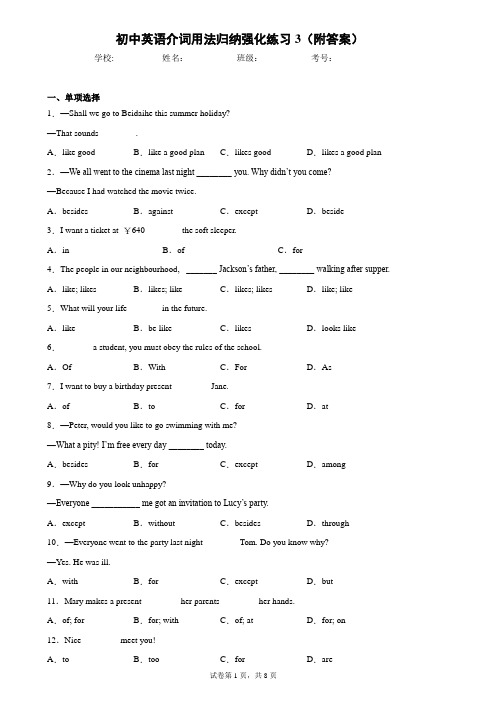
初中英语介词用法归纳强化练习3(附答案)学校:___________姓名:___________班级:___________考号:___________一、单项选择1.—Shall we go to Beidaihe this summer holiday?—That sounds ________.A.like good B.like a good plan C.likes good D.likes a good plan 2.—We all went to the cinema last night ________ you. Why didn’t you come?—Because I had watched the movie twice.A.besides B.against C.except D.beside3.I want a ticket at ¥640________ the soft sleeper.A.in B.of C.for4.The people in our neighbourhood, ________ Jackson’s father, ________ walking after supper. A.like; likes B.likes; like C.likes; likes D.like; like 5.What will your life _______ in the future.A.like B.be like C.likes D.looks like6._______ a student, you must obey the rules of the school.A.Of B.With C.For D.As7.I want to buy a birthday present ________ Jane.A.of B.to C.for D.at 8.—Peter, would you like to go swimming with me?—What a pity! I’m free every day ________ today.A.besides B.for C.except D.among 9.—Why do you look unhappy?—Everyone ___________ me got an invitation to Lucy’s party.A.except B.without C.besides D.through 10.—Everyone went to the party last night________ Tom. Do you know why?—Yes. He was ill.A.with B.for C.except D.but11.Mary makes a present ________ her parents ________ her hands.A.of; for B.for; with C.of; at D.for; on 12.Nice ________ meet you!A.to B.too C.for D.are13.Are you __________ or ________ this plan?A.agree;disagree B.disagree;for C.against;for14.—We’re all here ________ Lily. Where’s she?—She’s gone to the library.A.beside B.besides C.except D.of15.The girl ________ red is my sister.A.wear B.in C.on16.— Our teacher ________ a friend to me.— She is so kind.A.likes B.is like C.like D.is liking17.My parents work every day ________ Sunday.A.except B.except for C.expect D.besides18.I like flowers. I hope to study at a school ________ many flowers and trees in it.A.in B.with C.on D.by19.I left my keys in the room yesterday. I had to get in ________ the window.A.over B.through C.across20.They all went home ________ Mr. Li. He had to clean the offices ________ watering flowers. A.except; besides B.besides; except C.except; beside 21.—What will you do if you have two days ________?—I’d like to go ________ a trip to Nanjing.A.of; for B.off; on C.off; to D.of; for22.—All the workers went home yesterday ________ Mr. Smith. Why?—Because he was on duty.A.except B.except for C.besides D.beside23.In France, you’re not supposed to eat anything with your hands ________ bread. A.besides B.except C.beside D.against 24.Simon is a good boy ________ his bad temper.A.except B.besides C.but D.except for 25.The school is well built ________the classrooms are not air-conditioned.A.except B.besides C.except for D.except that 26.We need fifteen more people ________our team to complete this task.A.except B.besides C.except for D.beside27.—I love ping-pong. It’s very easy. What ________ you, Jenny?—It’s not easy ________ me. I don’t love it.A.about; for B.for; about C.about; about28.I really want to buy this set of furniture. It is good __________ the price.A.except B.besides C.besides that D.except for29.All of us helped to clean up the old people’s home ________ Matt. He was attending a meeting. A.besides B.against C.except D.with30.—Dais y, go and see what’s happening to the windows.—Nothing serious. The heavy rain is beating ________ them.A.through B.across C.against D.above31.—Do you know the man ________ a white coat?—Yes, He is my uncle. He has short hair ________ glasses.A.in, with B.in, wears C.with, wears D.with, with 32.What do you like ________breakfast?A.in B.for C./33.—What does Millie like? I want to buy something for her.—Millie, ________ her mother, enjoys eating snacks.A.like B.likes C.love D.loves34.It’s time __________ lunch.A.to B.of C.for D.on35.The new jeans look nice ________ Grace because she looks nice ________ blue.A.in; on B.on; in C.for; on D.to; in36.When the bus stopped, we all________.A.get it on B.get it off C.get off it D.get it down 37.—Thanks ________ our government, we can play sports on the new playground next week. —That’s for sure! And we’ll have a sports meeting ________ one month.A.for, in B.for, after C.to, in38.—What’s the weather like in Kunming in winter?— The temperature is always ________ zero and it is warm all year round.A.above B.below C.among D.between39.________ a father, she has a younger brother to support.A.Beside B.Besides C.Except D.Except for 40.The clothes are ________ sale ________ Saturday morning to Sunday afternoon.A.on; from B.for; in C.at; on41.Peter, ________ other boys, ________ playing football.A.like; like B.like; likesC.likes; likes D.likes; like42.—Everyone learned about the first aid in this morning’s class ________Tom.― What a pity! He miss ed the class.A.except B.with C.for D.from43.The students in Class Two are all in the playground ________ Cindy. She is asking Mr. White a question in the office now.A.except B.against C.around D.for44.—Mum, it’s so hot today. I want to eat some ice cre ams.—Sorry, Sherry! There is juice, cola and milk in the fridge _________ ice creams.A.except B.with C.for D.past45.The price of oil increased _______ 5%.A.to B.in C.by D.of46.— What are you doing, Li Ming?—I’m reading The Old Man and the Sea ________ Hemingway.A.by B.over C.for D.at47.—Alice, would you like to go hiking us?—What a pity! I am free every day _________ today.A.for B.except C.besides D.among48.The door is ________ narrow for such a fat man ________.A.too; to go B.enough; to go C.to; to go to D.too; to go through. 49.—Do you like to sleep with the windows ___________?—Yes, I’d like to feel the air and wind.A.open B.opened C.close D.closed50.The environment, ________ your education, your experiences and people around you can change your personality.A.including B.included C.includes D.include51.It’s not easy ________ me ________ finish walking a 100-kilometer trail within 48 hours.A.to; to B.for; to C.to; for D.for; for52.Classmates in our grade ________ a big family. Everyone really ________ living in a place ________ that.A.are like; likes; like B.like; likes; is likeC.are like; like; likes D.like; is like; likes53.We link the following sounds together except(除了)________.A.big orange B.for them C.high up D.keep busy54.— I can’t reach the ball on the roof.— You can put a ladder ________ the wall and climb up.A.on B.over C.against D.across55.— Did you feel ________was selfish of Jack to hide the comic books?— Yes. It is important ________ a boy to learn to share.A.that; of B.that; for C.it; of D.it; for56.That film ________ magic because you can feel the wind and smell the food.A.like B.is like C.likes D.look like57.Andy often helps her mother ________ the housework on Sundays.A.to B.with C.doesn’t do D.isn’t do58.It is hard for people to move forward with a strong wind ________ hard.A.blown B.blowing C.to blow59.Andy’s red clothes stood out clearly ________ the snow.A.by B.over C.against D.beyond60.All of us helped clean up the city park last Sunday ________ Peter. He said he got a strong feeling of satisfaction from it.A.except B.besides C.without D.against61.—Thanks for looking after me ________ my illness, Millie.—Don’t mention it. That’s what friends are for.A.beyond B.through C.across D.with62.The ending of the story was so surprising and fully went ________ my imagination.A.across B.over C.through D.beyond63.—I don’ t know how to get to the New Mart shopping center, Dad.—Download (下载) Baidu Map on your phone, and you can find it ________ difficulty.A.over B.in C.without D.by64.—I think all the teachers will help those hard-working students ________ Li Juan.—I agree with you.A.such as B.for example C.as D.like65.Li Ming is a student ________ Class One, Grade Eight.A.in B.of C.for D.A and B66.________ the evening ________ May 19th, we arrived at the Bund.A.In;on B.On;on C.In;of D.On;of67.Li Ping usually listens ______ music at home.A./ B.to C.the D.a68.Please don't go ________ me. I don't want to be here alone.A.with B.for C.to D.without69.He ________ ________ a father to me.A.is, likes B.is like C.be like D.looks like70.We have many sweaters ________ red, green and purple _____ only $29.A.for, in B.in, at C.in, for D.about, at71.The trees help to fight all kinds of pollution ________ the air pollution, noise pollution and water pollution.A.because B.for example C.though D.such as72.The coach came into the room ________ a smile on his face.A.with B.to C.for73.We all went to watch the football match ________ Tim. He didn’t feel well and stayed at home. A.except B.to C.with74.—With his leg ________ in the game, I’m afraid Tony can’t take part in the next match.—I ________ his home the other day, and his mum said he was still in hospital.A.injuring; have contacted B.being injured; have contactedC.to be injured; contacted D.injured; contacted75.______ March 12th, all the students went to plant trees near the river ______ Jenny. Her mother was ill in hospital, so she had to take care of her.A.In, without B.On, besides C.On, except D.During, among76.—I want to watch TV the whole day after the long journey.—You shouldn’t watch TV too much. It’s bad________your eyes.A.with B.in C.on D.for77.________ the river stands a power station. You can find it easily.A.In B.Far C.Beyond D.Under78.—Why isn't he showing up at the birthday party?—He is racing ________ the clock to finish his report on his project.A.beyond B.over C.against D.through79.—Do you think Brazil will beat Japan in the next match?—No. My friends all expect Brazil to win ________ me.A.with B.except C.without D.besides80.________ his father, he ________ reading a history book.A.Like; like B.Likes; likes C.Likes; like D.Like; likes81.You can get ________ my house by bike. You can also get ________ here by bus.A.to; to B./; / C./; to D.to; /82.Clark his father and his father very young.A.looks; looks B.looks like; looks C.looks; looks like D.looks like; looks like 83.—What did Uncle Paul do five years ago?—He worked ________ a bus driver.A.at B.of C.as D.in84.She a mother to me. So I her very much.A.likes; like B.is like; like C.likes; am like D.is like; am like85.It’s not easy school a ropeway.A.to go; at B.to go to; on C.go; on D.go to; by86.This is a famous museum ________ lots of paintings.A.has B.have C.having D.with87.He usually has some bread ________ breakfast and he likes reading newspapers ________ breakfast. A.for; on B.to; at C.in; on D.for; at88.What do you usually have ________ supper?A.for B.at C.in D.of89.The sofa is used ________ a bed sometimesA.for B.of C.to D.as90.The Great Wall was first built by ancient people to separate them ________ their enemies.A.from B.against C.for D.with91.—Have you heard ________ the danger of cicadas (蝉)?-Yes. They are harmful ________ the cherry trees.A.from; to B.of; to C.about; with92.The birdwatchers decided to begin to study the changes ________ their numbers ________ a snowy morning.A.in; on B.in; in C.to; on D.to; by93.—Do you have ________ time ________ breakfast?—No, I don’t.A.many; to B.many; for C.much; to D.much; for94.I think the mooncake will taste better ________some meat in it.A.for B.from C.after D.with95.All the guests in the hotel died after the earthquake ________ him, because he was awake and ran out in time.A.except B.beside C.with D.besides96.Usually, ________ is difficult ________ baby pandas to live in the wild. They are not good at finding food for themselves.A.that; for B.that; of C.it; for D.it; of97.We all passed the exam ________ Wang Lei. He felt very sad.A.except B.since C.with D.besides98.After the terrible flood in Leshan, a number of people offered to clean the street as volunteers, _______ teachers and officers.A.including B.instead of C.included99.—Is it time ________ supper?—Yes. It’s time for us ________ have supper.A.to; to B.for; to C.for; for D.to; for100.—_________ is the letter _________?—It is from my pen pal, Jim.A.Where, from B.What, for C.Who, for D.Who, from参考答案1.B 2.C 3.C 4.D 5.B 6.D 7.C 8.C 9.A 10.C 11.B 12.A 13.C 14.C 15.B 16.B 17.A 18.B 19.B 20.A 21.B 22.A 23.B 24.D 25.D 26.B 27.A 28.D 29.C 30.C 31.A 32.B33.A34.C35.B36.C37.C38.A39.B40.A41.B42.A43.A44.A45.C46.A47.B48.D49.A50.A51.B52.A53.B54.C55.D56.B57.B58.B59.C60.B61.B62.D63.C64.D65.D66.D67.B68.D69.B70.C71.D72.A73.A74.D75.C76.D77.C78.C79.B80.D81.D82.B83.C84.B85.B86.D87.D88.A89.D90.A91.B92.A93.D94.D95.A96.C97.A98.A99.B100.D答案第1页,共1页。
初中英语介词练习题&详解
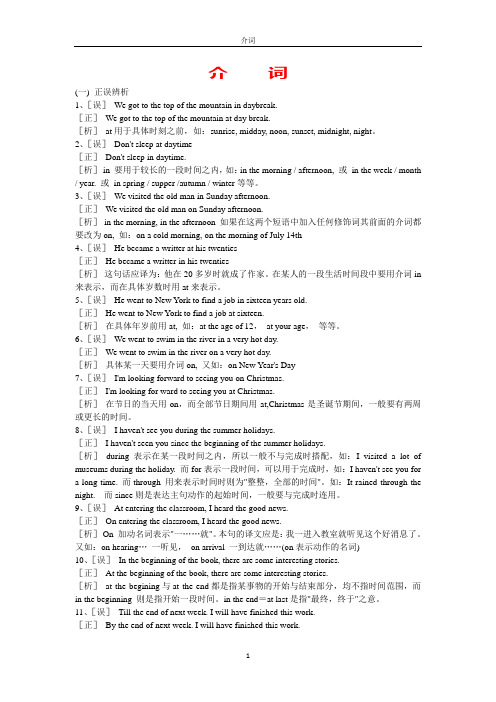
介词(一) 正误辨析1、[误]We got to the top of the mountain in daybreak.[正]We got to the top of the mountain at day break.[析]at用于具体时刻之前,如:sunrise, midday, noon, sunset, midnight, night。
2、[误]Don't sleep at daytime[正]Don't sleep in daytime.[析]in 要用于较长的一段时间之内,如:in the morning / afternoon, 或in the week / month / year. 或in spring / supper /autumn / winter等等。
3、[误]We visited the old man in Sunday afternoon.[正]We visited the old man on Sunday afternoon.[析]in the morning, in the afternoon 如果在这两个短语中加入任何修饰词其前面的介词都要改为on, 如:on a cold morning, on the morning of July 14th4、[误]He became a writter at his twenties[正]He became a writter in his twenties[析]这句话应译为:他在20多岁时就成了作家。
在某人的一段生活时间段中要用介词in 来表示,而在具体岁数时用at来表示。
5、[误]He went to New Y ork to find a job in sixteen years old.[正]He went to New Y ork to find a job at sixteen.[析]在具体年岁前用at, 如:at the age of 12,at your age,等等。
初中英语语法基础——常见介词用法辨析和同步练习题 (有参考答案)

初中英语语法基础——常见介词用法辨析一、“介词”的重要地位:介词是初中的英语的重点,其中一些意思相近的易混淆的介词区分更是需要我们理清楚。
今天就帮你总结一下初中阶段高频出现的一些易混淆的介词用法,让你从此告别看到意思相近介词就一脸懵的囧状。
二、常见介词短语辨析:(1) as, likeas表示“作为”强调身份,like(介词)表示“像”As a teacher, he cares for these children.Like a teacher, he cares for these children.(2) with, inwith表示“外貌特征或附带的东西” ; “用……作工具”in表示“衣着”;“用某语言”,在固定搭配中也可用in。
A man with dark glasses wanted to buy drinks.A man in black wanted to buy drinks.The boy is learning to write in pencil / with a pencil.He retold the text in English.(3) for, tofor表示“为了”;to表示动作对象, “对, 向”He would do anything for his motherland.Did you mention this to my father? 你对我父亲提起过这件事吗?for 表示“就某情况而说”;to 表示一“对某对象而言”It’s quite warm today for February. 就二月的天气,今天够暖和的。
What he told you just now wasn’t new to me. 他刚对你说的话对我并不新鲜。
(4) except, besidesexcept表示“除……之外”,不包括在内, 指从总体中排除一部分;besides表示“除……之外”,包括在内,指除了一部分还有另一部分。
初中英语介词的用法总结
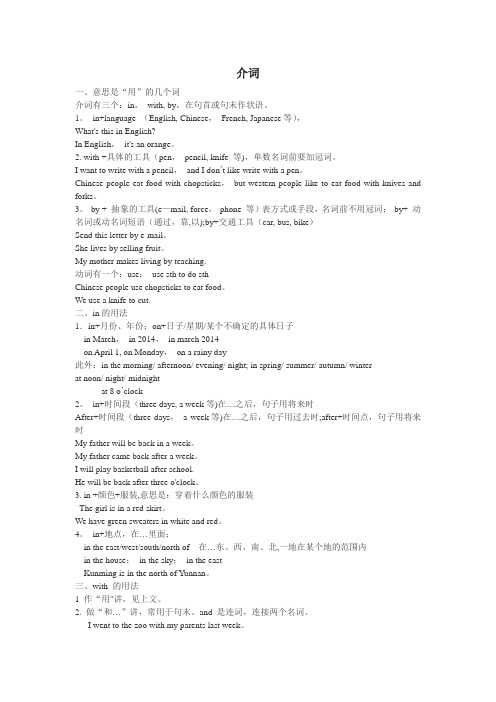
介词一、意思是“用”的几个词介词有三个:in,with, by,在句首或句末作状语。
1。
in+language (English, Chinese,French, Japanese等),What's this in English?In English,it's an orange。
2. with +具体的工具(pen,pencil, knife 等),单数名词前要加冠词。
I want to write with a pencil,and I don’t like write with a pen。
Chinese people eat food with chopsticks,but western people like to eat food with knives and forks。
3。
by + 抽象的工具(e—mail, force,phone 等)表方式或手段,名词前不用冠词;by+ 动名词或动名词短语(通过,靠,以);by+交通工具(car, bus, bike)Send this letter by e-mail。
She lives by selling fruit。
My mother makes living by teaching.动词有一个:use;use sth to do sthChinese people use chopsticks to eat food。
We use a knife to cut.二、in的用法1.in+月份、年份;on+日子/星期/某个不确定的具体日子in March,in 2014,in march 2014on April 1, on Monday,on a rainy day此外:in the morning/ afternoon/ evening/ night; in spring/ summer/ autumn/ winterat noon/ night/ midnightat 8 o’clock2。
(完整版)初中英语介词用法详解与练习
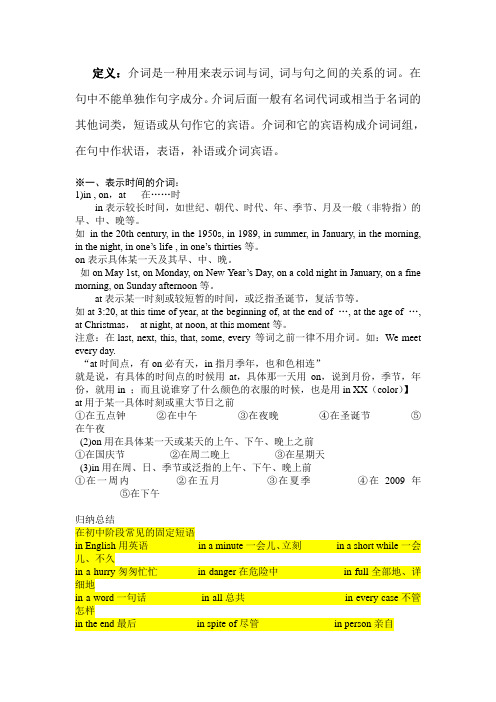
定义:介词是一种用来表示词与词, 词与句之间的关系的词。
在句中不能单独作句字成分。
介词后面一般有名词代词或相当于名词的其他词类,短语或从句作它的宾语。
介词和它的宾语构成介词词组,在句中作状语,表语,补语或介词宾语。
※一、表示时间的介词:1)in , on,at 在……时in表示较长时间,如世纪、朝代、时代、年、季节、月及一般(非特指)的早、中、晚等。
如in the 20th century, in the 1950s, in 1989, in summer, in January, in the morning, in the night, in one’s life , in one’s thirties等。
on表示具体某一天及其早、中、晚。
如on May 1st, on Monday, on New Year’s Day, on a cold night in January, on a fine morning, on Sunday afternoon等。
at表示某一时刻或较短暂的时间,或泛指圣诞节,复活节等。
如at 3:20, at this time of year, at the beginning of, at the end of …, at the age of …, at Christmas,at night, at noon, at this moment等。
注意:在last, next, this, that, some, every 等词之前一律不用介词。
如:We meet every day.“at时间点,有on必有天,in指月季年,也和色相连”就是说,有具体的时间点的时候用at,具体那一天用on,说到月份,季节,年份,就用in ;而且说谁穿了什么颜色的衣服的时候,也是用in XX(color)】at用于某一具体时刻或重大节日之前①在五点钟______②在中午________③在夜晚________④在圣诞节________⑤在午夜_________(2)on用在具体某一天或某天的上午、下午、晚上之前①在国庆节_________②在周二晚上_________③在星期天_________(3)in用在周、日、季节或泛指的上午、下午、晚上前①在一周内_________②在五月_________③在夏季_________④在2009年_________⑤在下午_________归纳总结在初中阶段常见的固定短语in English用英语in a minute一会儿、立刻in a short while一会儿、不久in a hurry匆匆忙忙in danger在危险中in full全部地、详细地in a word一句话in all总共in every case不管怎样in the end最后in spite of尽管in person亲自in fact事实上in good health身体健康的in front of在……前面in some ways在某些方面in common共同的in public当众☆考题再现:---Who was the first man with A(h1n1) flu in mainland China know for sure?---________May 11,2009.A InB OnC ForD Since2、before、afterbefore表示“在某时刻或某件事之前”,after用在时刻或某件事之后。
初中英语介词解题技巧讲解及练习题(含答案)含解析
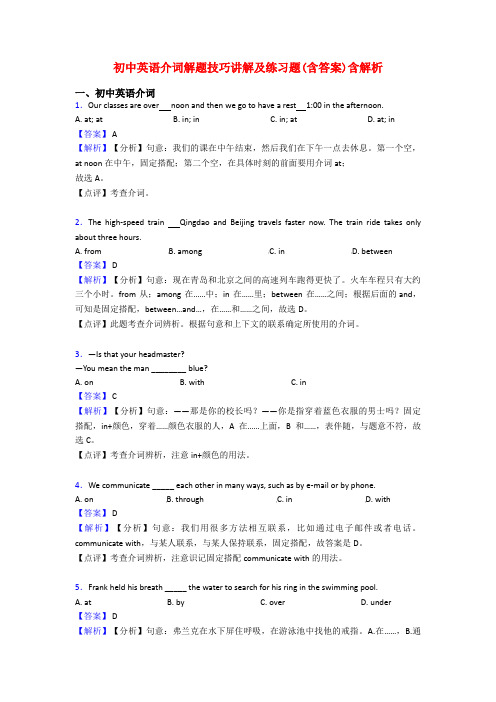
初中英语介词解题技巧讲解及练习题(含答案)含解析一、初中英语介词1.Our classes are over noon and then we go to have a rest 1:00 in the afternoon. A. at; at B. in; in C. in; at D. at; in【答案】 A【解析】【分析】句意:我们的课在中午结束,然后我们在下午一点去休息。
第一个空,at noon在中午,固定搭配;第二个空,在具体时刻的前面要用介词at;故选A。
【点评】考查介词。
2.The high-speed train Qingdao and Beijing travels faster now. The train ride takes only about three hours.A. fromB. amongC. inD. between【答案】 D【解析】【分析】句意:现在青岛和北京之间的高速列车跑得更快了。
火车车程只有大约三个小时。
from 从;among 在……中;in 在……里;between 在……之间;根据后面的and,可知是固定搭配,between…and…,在……和……之间,故选D。
【点评】此题考查介词辨析。
根据句意和上下文的联系确定所使用的介词。
3.—Is that your headmaster?—You mean the man ________ blue?A. onB. withC. in【答案】 C【解析】【分析】句意:——那是你的校长吗?——你是指穿着蓝色衣服的男士吗?固定搭配,in+颜色,穿着……颜色衣服的人,A 在……上面,B 和……,表伴随,与题意不符,故选C。
【点评】考查介词辨析,注意in+颜色的用法。
4.We communicate _____ each other in many ways, such as by e-mail or by phone.A. onB. throughC. inD. with【答案】 D【解析】【分析】句意:我们用很多方法相互联系,比如通过电子邮件或者电话。
- 1、下载文档前请自行甄别文档内容的完整性,平台不提供额外的编辑、内容补充、找答案等附加服务。
- 2、"仅部分预览"的文档,不可在线预览部分如存在完整性等问题,可反馈申请退款(可完整预览的文档不适用该条件!)。
- 3、如文档侵犯您的权益,请联系客服反馈,我们会尽快为您处理(人工客服工作时间:9:00-18:30)。
语法专题:介词用法精讲精练介词:英文缩写是prep.是英文preposition的缩写。
介词是英语中最活跃的词类之一。
同一个汉语词汇在英语中可译成不同的英语介词。
例如汉语中的“用”可译成:(1)用英语(in English);(2)用小刀(with a knife);(3)用手工(by hand);(4)用墨水(in ink)等。
所以,千万不要以为记住介词的一两种意思就掌握了这个介词的用法,其实介词的用法非常广泛,搭配能力很强,越是常用的介词,其含义越多。
1.表示地点位置的介词1)at ,in, on, to,forat (1)表示在小地方; (2)表示“在……附近,旁边”in (1)表示在大地方; (2)表示“在…范围之内”。
on 表示毗邻,接壤,“在……上面”。
to 表示在……范围外,不强调是否接壤;或“到……”2)above, over, on 在……上above 指在……上方,不强调是否垂直,与below相对;over指垂直的上方,与under相对,但over与物体有一定的空间,不直接接触。
on表示某物体上面并与之接触。
The bird is flying above my head.There is a bridge over the river.He put his watch on the desk.3)below, under 在……下面under表示在…正下方below表示在……下,不一定在正下方There is a cat under the table.Please write your name below the line.4)in front of, in the front of在……前面in front of…意思是“在……前面”,指甲物在乙物之前,两者互不包括;其反义词是behind(在……的后面)。
There are some flowers in front of the house.(房子前面有些花卉。
)in the front of 意思是“在…..的前部”,即甲物在乙物的内部.反义词是at the back of…(在……范围内的后部)。
There is a blackboard in the front of our classroom.我们的教室前边有一块黑板。
Our teacher stands in the front of the classroom.我们的老师站在教室前.(老师在教室里)5)beside,behindbeside 表示在……旁边behind 表示在……后面2.表示时间的介词1)in , on,at 在……时in表示较长时间,如世纪、朝代、时代、年、季节、月及一般(非特指)的早、中、晚等。
如in the 20th century, in the 1950s, in 1989, in summer, in January, in the morning, in one’s life , in one’s thirties等。
on表示具体某一天及其早、中、晚。
如on May 1st, on Monday, on New Year’s Day, on a cold night in January, on a fine morning, on Sunday afternoon等。
at表示某一时刻或较短暂的时间,或泛指圣诞节,复活节等。
如at 3:20, at this time of year, at the beginning of, at the end of …, at the age of …, at Christmas,at night, at noon, at this moment等。
注意:在last, next, this, that, some, every 等词之前一律不用介词。
如:We meet every day.2)in, after 在……之后“in +段时间”表示将来的一段时间以后;“after+段时间”表示过去的一段时间以后;“after+将来的时间点”表示将来的某一时刻以后。
3)from, since 自从……from仅说明什么时候开始,不说明某动作或情况持续多久;since表示某动作或情况持续至说话时刻,通常与完成时连用。
since表示"自(某具体时间)以来",常用作完成时态谓语的时间状语。
since liberation(1980)自从解放(1980年)以来They have been close friends since childhood.他们从小就是好朋友。
(1)since the war是指"自从战争结束以来",若指"自从战争开始以来",须说"sincethe beginning of the war"。
(2)不要将since与after混淆。
比较:He has worked here since 1965.(指一段时间,强调时间段)自从1965年以来,他一直在这儿工作。
He began to work here after 1965.(指一点时间,强调时间点)从1965年以后,他开始在这儿工作。
4)after, behind 在……之后after主要用于表示时间;behind主要用于表示位置。
时间名词前介词用法口诀年前周前要用in具体日子要用on遇到几号也用on上午下午得是in要说某日上下午用on换in记清楚午夜黄昏用at黎明用它也不错at用在时分前说“差”可要用上to说"过''要用past3.表示运动方向的介词:across, through 通过,穿过across表示横过,即从物体表面通过,与on有关,为二维through穿过,即从物体内部穿过,与in有关,为三维。
4.表示“在……之间”的介词:表示“在……之间”的介词在英语中属于方位介词,如in front of ,behind ,on,in,near,under,upbetween, amongbetween指在两个人或两个事物之间;among指在三个或三个以上的人或事物之间。
5.表示其他意义的介词1)on ,about 关于on 表示这本书,这篇文章或演说是严肃的,或学术性的,可供专门研究这一问题的人阅读;about表示内容较为普通,不那么正式。
2)by, with, in 表示方法、手段、工具by 以……方法、手段或泛指某种交通工具;with 表示用…工具、手段,一般接具体的工具和手段;in 表示用…方式,用…语言(语调、笔墨、颜色)等;3)except, besides 除了except 除……之外,不包括在内;besides 除……之外,包括在内。
Except for Mr. Wang, we went to see the film.(王先生没去)Besides Mr. Wang, we also went to see the film.(王先生也去了)常见搭配1.动词+介词,如:listen to, laugh at, write to, hear from, get to, look at, shout at, shout to, knock at, look for, look at, ask for, wait for, get on, get to, put on, turn on, operate on, take off, turn off, learn from, worry about ...2.形容词+介词,如:be afraid of, be full of, be angry with, be strict with, be busy with, be good at, be good/bad for, be late for, be sorry for, be ready for, be famous for, be polite to,be far from... be close to3.名词+介词/ 介词+名词the key to, the visit to, at home, in surprise, after class, for ever, on time, in time at last,at first, for example...三.巩固练习选词填空1. Taiwan is _______ the southeast of China.(in, on, to)2. Go ________ the bridge ________ the river, you’ll find the shop.(ac ross, through; over, above)3. I go to school __________7:30 every morning.(in, on, at)4. He would like to meet her _____8:00 and 9:00 tomorrow morning.(b etween, among )5. The Greens have lived in China _____ three years.(in, for, after)6. We go to school every day _______ Saturday and Sunday.(except, b esides)7. He wrote the letter _________ ink.(by, with ,in)8. She returned to her country ________five years.(in, after, for)9. There is a big tree _________ our classroom.(after, behind)10. I usually go to work _________ bike.(by, on, with)单项选择1. There’s something _______ her that I really don’t like.A. withB. forC. toD. about2. I was angry _______ him for keeping me waiting.A. withB. toC. aboutD. on3. _______ going to French evening classes twice a week she does yoga(瑜伽)on WednesdaysA. Because ofB. ExceptC. BesidesD. But for4. ______cooking, writing and running the farm, she was very busy.A. AmongB. BetweenC. OverD. As5. _______ one old lady, the bus was empty.A. ExceptB. Except forC. ButD. Besides6. They promise that the work would all be finished _______ next week.A. untilB. inC. byD. to7. We didn’t live together. We kept in touch _______ writing often.A. withB. ofC. onD. by8. It was very kind of her. She insisted _______ her car to us.A. to lendB. lendingC. on lendingD. in lending9. We’ve talked a lot _______ cars. What about trains?A. ofB. withC. aboutD. in10. “How long have you been here?” “____ the end of last month.”A. InB. ByC. AtD. Since11. The chemistry teacher required the students _______ moreattention _______ the lab cleanA. to pay, to keepB. to paying, to keepingC. to pay, to keepingD. paying, keeping12. This exam is very important for her. She won’t go home _____the exam.A. until afterB. after untilC. untilD. from13. This suit fits me well _______ the trousers are too long.A. onlyB. except forC. except thatD. except14. After a quick dinner, they set off ______ car and made ______ thenearest town.A. by, toB. in, toC. by, forD. in, for看似相同,但意义有别的词组英语中有一些介词词组和动词词组,它们从形式上看似乎基本相同,但在意义上却截然不同。
